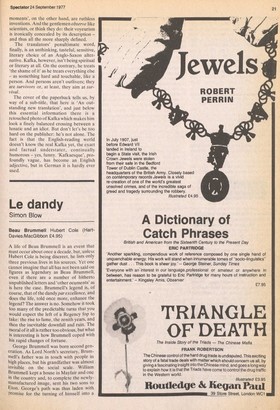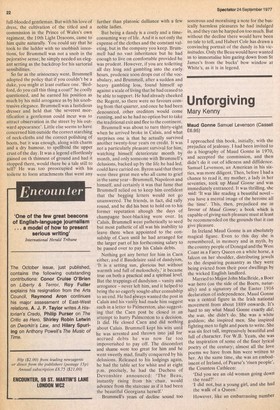Le dandy
Simon Blow
Beau Brummell Hubert Cole (HartDavies/MacGibbon £4.95) A life of Beau Brummell is an event that must occur about once a decade, but, unless Hubert Cole is being discreet, he lists only three previous lives in his sources. Yet one cannot imagine that all has not been said on figures as legendary as Beau Brummell, even if there are a number of hitherto unpublished letters and 'other ocuments' as is here the case. Brummell's legend is, of course, that of the dandy par excellence, and does the life, told once more, enhance the legend? The answer is no. Somehow it took too many of the predictable turns that you would expect the left of a Regency fop to take: the rise to fame, the zenith years, and then the inevitable downfall and ruin. The moral of it all is rather too obvious, but what is interesting is how Brummell coped with his rapid changes of fortune.
George Brummell was born second generation. As Lord North's secretary, Brummell's father was in touch with people in high places, but his grandfather was almost invisible on the social scale. William Brummell kept a house in Mayfair and one in the country and, to complete the newlymanufactured image, sent his two sons to Eton. George's path was thus laden with promise for the turning of himself into a full-blooded gentleman. But with his love of dress, the cultivation of the titled and a commission in the Prince of Wales's own regiment, the 10th Light Draoons, came to him quite naturally. You could say that he took to the ladder with no snobbish intentions, for Brummell was not a snob in the pejorative sense; he simply needed an elegant setting as the backdrop for his sartorial sensibilities.
So far as the aristocracy went, Brummell adopted the policy that if you couldn't be a duke, you might at least outface one. 'Bedford, do you call this thing a coat?' he coolly questioned, and he earned his position as much by his mild arrogance as by his unobtrusive elegance. Brummell was a fastidious dresser and held that 'the severest mortification a gentleman could incur was to attract observation in the street by his outward appearance'. Little else seems to have concerned him outside the correct starching of neck-cloths and the correct polishing of boots, but it was enough, along with charm and a dry humour, to spellbind the upper crust of the day. It was a legend effortlessly gained on th thinnest of ground and had it stopped there, would there be a talc still to tell? He was too preoccupied with his toilette to form attachments that went any further than platonic dalliance with a few noble ladies.
But being a dandy is a costly and a timeconsuming way of life. And it is not only the expense of the clothes and the constant valeting, but in the company you keep. Brummell had no vast inheritance but he had enough to live on comfortable provided he was prudent. However, if you are toiletting all day long and gambling into the early. hours, prudence soon drops out of the vocabulary, and Brummell, after a sudden and heavy gambling loss, found himself up against a scale of living that he had ceased to be able to support. He had already cheeked the Regent, so there were no favours coming from that quarter, and once he had been denounced, other creditors would come running, and so he had no option but to take the traditional exit and flee to the continent.
Brummell was about to turn thirty-eight when he arrived broke in Calais, and what surprises one is that he actually survived another twenty-four years on credit. It was not a particularly pleasant survival for him, watching himself deteriorate month by month, and only someone with Brummell's delusions, backed up by the life he had led, could have carried on. Byron said that there were three great men who all came to grief in the same year —Brummell, Napoleon and himself, and certainly it was that fame that Brummell relied on to keep him confident that the begging letters would not go unanswered. The friends, in fact, did rally round, and he did his best to hold on to his former reputation altough the days of champagne boot-blacking were over. In Calais, Brummell went pathetically to seed but most pathetic of all was his inability to leave there when appointed to the consulship of Caen until he had arranged for the larger part of his forthcoming salary to be passed over to pay his Calais debts.
Nothing got any better for him in Caen either, and if Baudelaire said of dandyism, 'It is a setting sun, glorious but without warmth and full of meloncholy,' it became true on both a practical and a spiritual level. But the trappings of dandyism — vanity and arrogance — never left him, and it helped to bring the so eagerly sought-after consulship to an end. He had always wanted the post in Calais and his vanify had made him suggest such in a letter to Palmerston, also suggesting that the Caen post be closed in an attempt to hurry Palmerston to a decision. It did. He closed Caen and did nothing about Calais. Brummell kept his wits until he was arrested and thrown into jail for accrued debts he was now far too impoverished to pay off. The discomfort and shame were too great for him and he went sweetly mad, finally conquered by his delusions. Released to his lodgings again, he had the table set for whist and at eight p.m. precisely, he had the Duchess of Devonshire announced: 'The Beau, instantly rising from his chair, would advance from the staircase as if it had been the beautiful Georgiana herself.'
Brummell's years of decline sound too sonorous and moralising a note for the basically harmless pleasures he had indulged in, and they can be harped on too much. But without the decline there would have been no tale to tell, and Hubert Cole has drawn a convincing portrait of the dandy in his vicissitudes. Only the Beau would have wanted us to immortalise him gazing down from St James's from the bucks' bow window at White's, as it is in legend.



































 Previous page
Previous page